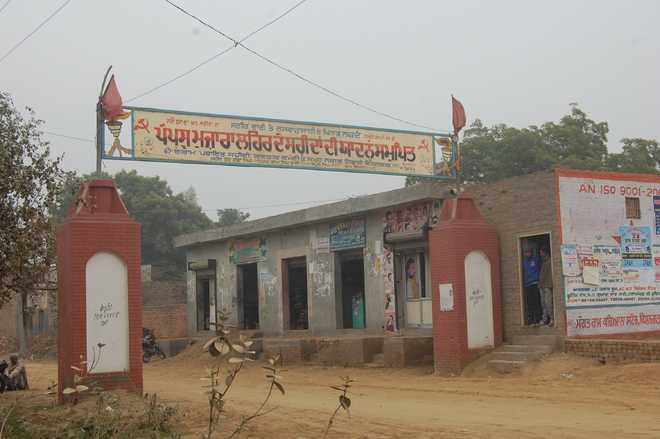
Kishangarh village’s memorial gate, dedicated to the martyrs of the PEPSU-Muzara movement. Photos by writer
Vishav Bharti
Tribune News Service
Kishangarh (Mansa), Jan 28
“Dedicated to the memory of martyrs of PEPSU-Muzara movement, who fought against feudalism and monarchy.” That is how Kishangarh’s memorial gate welcomes every visitor. Close to 100 metres away, we get our second welcome — “Suicides are not the way. Don’t run away, join the struggle,” workers of Bharti Kisan Union (Ugrahan) issue appeals on a tractor.
From being a beacon of the heroic Muzara (tenant) resistance to becoming a village with perhaps the most number of recorded suicides in Punjab, Kishangarh lives in two time zones.
The academic world knows the village through history books. Almost every second person, old or young, narrates the seven-decade-old epic tale in bits and pieces. In the 1940s, tenants had refused to pay batai (share) to landlords in various villages of Punjab. At Kishangarh, a battery of more than 100 policemen had tried to evict tenants on March 16, 1949, but they defeated the police. Three days later, canons started bombardment on the village on the orders of the Maharaja of Patiala. Tenants fought back the 400 men. They were arrested, tortured, jailed. But the movement spread out in more than 700 villages and thousands of acres of land was distributed among the landless, irrespective of their caste.
If the epic battle is part of village folklore, so are the suicides. Every 10th family here has seen suicide, says Mahinder Singh, a member of the Communist Party of India. He was just four when his village chased away the landlords. He says he first noticed the phenomenon of suicides in the mid-1990s. Before that, one had rarely heard of a suicide in this village.
Initially farmers committed suicide, he says, when the cotton crop — 25 to 35 per cent people sow cotton here — failed between the mid-1990s and early 2000s. These have continued since then and have become a routine feature.
Different surveys found that when it comes to debt-related suicides, Kishangarh not only tops in Mansa district but figures among the top five villages in the state.
Almost every family in the village has lost a relative to suicides, says Thakar Singh, BKU’s village unit president. He is the same young man who had been making the announcement on the tractor. “Let’s give a call from the village gurdwara speaker to families who have experienced suicide. You will see yourself how many families come together,” he says.
So far, he says, it has been a norm in the village that when a farmer commits suicide, fearing police harassment, the last rites are performed quietly. “Tusi gin vi ni sakde, ehna ne kine munde chup-chaap lakraan ch de dite (You can’t even count how many were cremated in a hush-hush manner),” he talks forcefully, a strange redness taking over his face.
Thakar Singh starts naming the farmers and labourers from the village who committed suicide. The list gets longer and longer, he counts up to 30. Each name Thakar Singh utters seems a tale waiting to be told. He accompanies us to several houses; every home has the same story to tell. If many lost hope due to the pest that ate away the cotton crop, some succumbed to health bills or the money spent on building houses; money spent on weddings too. Every story ends at death, leaving behind the debt.
Weddings, Mahinder Singh agrees, is one of the factors behind debt in this village too. “In our culture, the match is made on the basis of the land one owns. So when one boasts of land, there are certain expectations as well. Nobody ever discusses the debt. That is also the bitter truth; one can’t see off his daughter from home empty-handed,” he says.
After thinking for some time, he adds, “Perhaps the criteria of match-making in the present scenario should be the debt one owes. Only then will spending on weddings come down.”
Weddings are only one factor, says Thakar Singh. “The main reason,” he stresses, “is that agriculture has not remained viable. Look at the soaring prices of pesticides, fertilisers, diesel. Now we advise people that even if you commit suicide, it increases the burden on the family. The family left behind has to spend money on the last rites too.”
He says theirs is not the politics of surrender, but of resistance.
Thakar Singh and Mahinder Singh represent two eras of peasant activism. On the one hand are endless framed photographs of the dead — the recent past, Thakar Singh’s generation.
Mahinder Singh lives in the village’s glorious past; he shows us remains of the haveli of village landlords, who fled after the rise of the Muzara movement. He points to the last two pillars of the haveli that was abandoned and was finally demolished in 1998 by villagers and says, “That is how our forefathers fought back the canons with just kikar trunks.”
Sacrifices and suicides, both tales are told here with equal force.



























